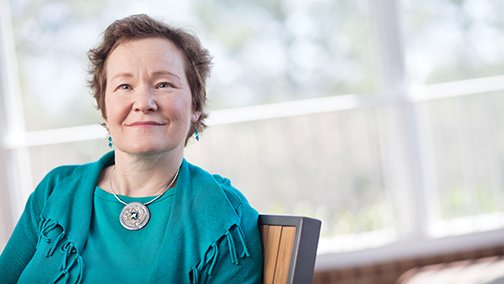
At a Glance
- Von Hippel-Lindau is a rare genetic disorder that causes benign and cancerous tumors to develop throughout the body.
- The VHL Alliance recently designated UVA Health System as a Comprehensive Clinical Care Center for its efforts to provide holistic, streamlined care to VHL patients and to advance the treatment of this complex disease.
- The Center has a patient navigator and newly appointed patient liaison to help patients get informed, manage their specialty care and cope with the effects of disease.
- UVA neurosurgeon and Center Director Ashok Asthagiri, MD, plans to hold a conference to educate primary care providers about VHL in the near future.
Von Hippel-Lindau (VHL) is a rare genetic disorder that is difficult to diagnose because the tumors and cysts it causes can first emerge, seemingly spontaneously, in any one of 10 organ systems and remain asymptomatic for years. VHL is a challenge to manage for the same reason: so many different parts of the body are vulnerable to the effects of this disease that a holistic approach is essential.
The VHL Alliance, an organization dedicated to raising awareness among care providers, as well as educating, supporting and improving quality of life for VHL patients, recognizes those centers that successfully meet the needs of these complex patients. University of Virginia Health System was recently designated a VHL Alliance Comprehensive Clinical Care Center, making UVA one of just 12 centers nationwide deemed capable of providing the complete spectrum of care that VHL patients — children as well as adults — require. It also means that UVA has made a substantial commitment to be a leader in VHL treatment.
“The Comprehensive Clinical Care Center designation is awarded to an institution that is committed to continual improvement and to working with the VHL Alliance to provide seamless, expert care for patients in a compassionate and patient-driven manner,” says Ashok R. Asthagiri, MD, a UVA neurosurgeon and director of the center. Originally founded by a family affected by VHL, the VHL Alliance is the preeminent resource and clearinghouse for patients, caregivers, researchers and the medical community.
Assembling a Diverse Team
VHL is caused by mutations on the von Hippel-Lindau tumor suppressor gene. Among the consequences are lesions that develop in the brain, spinal cord, eyes, ears, kidneys, lungs, liver, pancreas and connective tissue of the reproductive organs; renal cell carcinoma and pancreatic neuroendocrine tumors; and pheochromocytomas of the adrenal glands. There is no way to reverse VHL gene mutations, but early recognition and treatment can substantially decrease complications and prolong survival while also improving quality of life. This is especially important with renal cell cancer and pancreatic tumors, which, if not detected early, can metastasize.
Given the diversity of VHL symptoms, Comprehensive Clinical Care Centers must assemble a group of diverse specialists knowledgeable about VHL care. In addition to neurosurgery, UVA has assembled a team that that includes specialists in such disciplines as urology, endocrinology, ophthalmology, surgical oncology, radiology, palliative care and otolaryngology. “As a Comprehensive Clinical Care Center, we must be able to bring the latest treatment options to each and every clinical manifestation of VHL,” Asthagiri says.
Streamlining Multifaceted Care
Equally important, Comprehensive Clinical Care Centers must be capable of delivering that care in a highly coordinated, customized manner. “Every VHL patient is different,” Asthagiri explains. “Some patients have 6 to 12 different provider visits per year and others have 40 to 50. We use a hub-and-spoke model developed by the VHL Alliance to coordinate care and improve communication among specialists.”
Nancy Staton, RN, who serves as the team’s patient navigator, plays a critical role as the interface between patient and institution. “My job is to oversee each aspect of our patients’ care, making sure they see all the appropriate specialists in the most efficient manner,” she says. “Equally important, I help them understand what comes next in their treatment and how it fits into their overall plan of care.”
Putting a Patient on the Team
The VHL Alliance rubric also includes a patient liaison, a patient or caregiver of a patient who receives care at the center. At UVA, this is Karen Ramsey, a patient with complex manifestations of VHL who also previously served as chair of the VHL Alliance Board of Directors. “We are really lucky to have a patient liaison as knowledgeable as Karen,” Asthagiri says.
As patient liaison, Ramsey has a number of crucial responsibilities. She works closely with other patients, helping them understand the challenges they face and encouraging them to take a proactive role in their care management. She also represents the patient perspective to the clinical staff, providing insight to help improve the delivery of care. Finally, she provides feedback to the VHL Alliance, helping it focus its efforts to best support patients and the medical community.
Because of her knowledge of VHL, Ramsey’s decision to come to UVA represents a much-appreciated vote of confidence in the institution. “We learned about Dr. Asthagiri and the UVA program through my involvement with the VHL Alliance,” Ramsey says. “We moved from Phoenix to Charlottesville because of UVA’s wonderful reputation.”
Engaging the Referring Physician
Asthagiri emphasizes that an essential partner in caring for patients with VHL is the primary care provider (PCP). For many physicians, the emergence of seemingly unrelated tumors and cysts in a patient can seem baffling, which is why Asthagiri plans to hold a regional conference at UVA to educate PCPs about the disease.
“My goal is to get to the point where we are known for providing comprehensive VHL care and can partner with astute local physicians for surveillance as well as early diagnosis,” Asthagiri says. “Physicians in local communities are critical to our holistic approach to VHL management.”
To refer a patient to UVA Health System, call 800.552.3723.